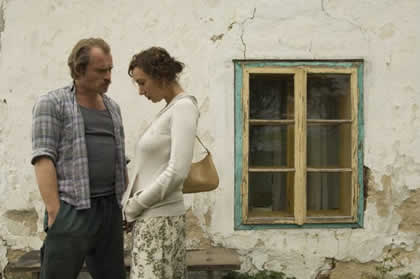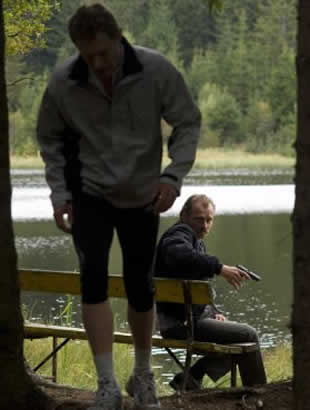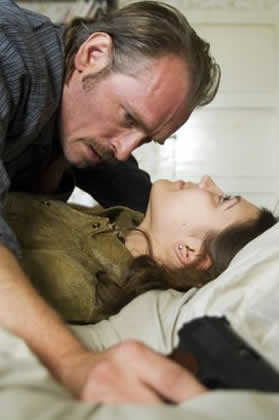 Revanche starts in a late summer. A small lake in the woods. No people. Silence. Not far away, a newly built house inhabited by a couple: Robert (Andreas Lust) and Susanne (Ursula Strauss). They live an ordinary life like so many other people. Meanwhile in Vienna. Nightlife, red light district, the world of prostitution. Here money rules. Most people have jobs that barely let them scrape by. Like Alex and Tamara (Johannes Krisch and Irina Potapenko). She is a prostitute from Ukraine; he, the boss’ errand boy. They are lovers, but they have to keep it a secret. Employees aren’t allowed to engage in amorous relations.
Revanche starts in a late summer. A small lake in the woods. No people. Silence. Not far away, a newly built house inhabited by a couple: Robert (Andreas Lust) and Susanne (Ursula Strauss). They live an ordinary life like so many other people. Meanwhile in Vienna. Nightlife, red light district, the world of prostitution. Here money rules. Most people have jobs that barely let them scrape by. Like Alex and Tamara (Johannes Krisch and Irina Potapenko). She is a prostitute from Ukraine; he, the boss’ errand boy. They are lovers, but they have to keep it a secret. Employees aren’t allowed to engage in amorous relations.
They want to escape this life, but they need money first. Alex devises a plan to rob a bank in a little village out in the countryside. Tamara wants to come along, and he reluctantly agrees. Everything is going exactly as planned until a policeman happens to walk up: Robert. He fires a few shots at the getaway car as it speeds off and hits the young woman. Overcome with despair, Alex leaves the body behind in a forest clearing. He lies low at his grandfather’s place. The old man lives on a desolate farm at the edge of the woods. Silent and withdrawn, Alex begins the task of chopping the firewood for the approaching winter. He is consumed with pain, grief, and the hate he harbors for the man responsible for Tamara’s death. A lake in the woods, this is where Robert goes to be alone. Now he comes here to try to sort out what happened. Alex observes the policeman, spies on him, follows him as he goes about his daily routine. And he meets Susanne, the policeman’s wife. The lives of all these people will change as a result of Tamara’s death – more radically than they suspect. And autumn comes, just like every year.
Götz Spielmann, director of Revanche was Born in Wels in 1961, grew up in Vienna. He Started writing and directing while still in school. His first film was aired on television in 1978. In 1980 he started studying screenwriting and directing at the Vienna Film Academy. Two films completed during his studies received international prizes and were screened at the Stadtkino, an art house cinema in Vienna. Spielmann graduated in 1987. Soon afterwards, he wrote and directed four cinema and made-for-TV films in succession. In 1999, after several years of silence, his next feature film “The Stranger” (Die Fremde) became Austria’s nomination for the Foreign Language Oscar. This was followed by “Spiel im Morgengrauen,” a made-for-TV movie, and in 2004 the feature “Antares.” “Antares” was shown internationally at more than 30 festivals and at art house theaters in many countries including France, the USA, and Germany. “Antares” was nominated by Austria to compete for the Foreign Language Oscar. Its explicit sex scenes spark heated debate among Academy members. Since 2005 Götz Spielmann has also written and directed for the stage. In 2006 he wasawarded the Upper Austrian State Prize for Culture in the category of film. The same year he found the production company  Spielmannfilm.
Spielmannfilm.
Bijan Tehrani: In the last few films that I have seen from you, there is a lot of tension with faith and the role it can play in one’s life. It is interesting that you don’t portray anyone as black or white in your films. What was your motivation when you were writing this film?
Götz Spielmann: One of my first ideas—which may sound a bit poetic, but that is how first ideas start—was to tell an inner journey. It would be a journey that starts in the center of a city and ends with quietness. I wanted to tell a story that was about a transformation of the main character, a transformation with how he sees life—how he sees his own self. This would be started through a tragic accident, by losing the woman he loves. This was the first idea that I had.
BT: With your films you are, in a way, creating modern Greek stories. Have you ever had any interest in Greek mythology?
GZ: Yes, I have. I have interest in a lot of things, like modern science. But tragedy is one aspect of the ancient culture which interests me. But I am also very interested in modern science, like chaos theory, and complexity. There are a lot of sources for my work.
 BT: It is very clear that you deal with the complexity of situations; how things change people. How did you cast the film? When I watched the film, it was very hard to imagine anyone else playing these roles.
BT: It is very clear that you deal with the complexity of situations; how things change people. How did you cast the film? When I watched the film, it was very hard to imagine anyone else playing these roles.
GZ: The first thing I did was trying to find the best actors for the characters, which also means that I don’t care too much about names and stars; I just try to find the best possible actor for a character. Before I start the shoot, I rehearse with the actors, which for this film took about two weeks. In that time, we really tried to come very close to the characters and make them understand the characters very well, so they don’t have to think much during the shooting. This method makes the actor very authentic. And that is life; we just act and speak, and don’t control ourselves very often. We also give the actors a chance to research the milieus in which they have to act, so that they really know about the characters and their surroundings. For example, Irina Potapenko, who played the young prostitute, spent some nights in a brothel in Vienna. The clients didn’t know she was an actress. Also, Andreas Lust, who played the policeman, spent a week in a police station on the countryside. The actors brought a lot of knowledge into the film which, from time to time, is more than I have because they can concentrate their research more than I can.
BT: Did you allow the actors to change the dialogue at all during the shooting?
GZ: That depends on the scene. There are scenes in which the actors speak the dialogue word for word, because the dialogue really needs to be very clear. In other cases we change the dialogue during the rehearsal phase to see what works and what doesn’t. There are also scenes of great emotional weight, and then I usually use a kind of improvisation. I allow improvisation only in these types of scenes, when there is no use to write the dialogue, but this is seldom.
BT: The actor who plays the grandfather, Johannes Thanheiser, gives a magical performance. How old is he?
GZ: He was 82 when we shot, and is now 83.
BT: How did you work with him? Did you use the same process with him as with other actors?
GZ: It was the same process. Of course he couldn’t shoot for twelve hours, and needed some rest. But he is a very fit man for his age, and that was the only difference. He is an exceptional case, because I wrote the part  for him and always had him in my mind while writing.
for him and always had him in my mind while writing.
BT: Nature plays a big role in your film, it is like another character.
GZ: I love to hear that. That is what we tried to do.
BT: It comes to life through the visual style. How did you create the visual style of the film?
GZ: That is a very big question because, other than working with the actors, the visual style is the most important part for me as a director. I would say two things: the first thing is that shot-counter-shot is a very beautiful form in films, but it has lost a lot of its beauty, because most of the time it is now used without thinking; it has become a kind of formal cliché in films. This is very important for my formal work; that I try to have a real position for each shot-counter-shot, and never do it in shooting dialogue. Which means a lot of thinking and searching is required to film in a way in which the energy and tension of a scene happens within a picture, and not by editing or making a lot of cuts. This means that each picture needs a higher quality, higher tension, and more precision, because a spectator really has time to see it. This is different when you cut every three or four seconds, because they never really see the picture itself. So the way I shot requires another kind of concentration and curiosity from the actors to show  changes in a scene without cutting. There are a lot of changes within the picture, by the camera or by the actors, who change their positions in the pictures. It is very risky, because you cannot change a lot on the editing table if the scene is too slow or not shot in an interesting way. But I like the risk; no risk, no fun.
changes in a scene without cutting. There are a lot of changes within the picture, by the camera or by the actors, who change their positions in the pictures. It is very risky, because you cannot change a lot on the editing table if the scene is too slow or not shot in an interesting way. But I like the risk; no risk, no fun.
BT: In this film you also use elements of modern society, like the issue of human trafficking. Is this something that you did intentionally?
GZ: Yes, that is one level of it. I want to be authentic; authentic in how I tell the story, and in what is going on in our society. I see the conflicts and injustice in the world, and that mobilizes my artistic ability. Movies are only really good when they are authentic. But on the other hand, my basic interests are more profound and existential; I like to deal with questions of friends, love, death, and all of that. So, I try to be authentic and reflect our society, but my fundamental interests are stories which are somehow part of human nature, and more fundamental than a certain point in time.
BT: In your last film, “Antares”, there were complaints here in the U.S, especially from members from the Academy, about the graphic sexuality in the film. How do you respond to this kind of criticism?
GZ: I respect it, first of all. On the other hand, I never used sexuality or nakedness to just push up a story. When I create scenes in my films, they are always needed. I think my mind is quite free in this case, and maybe less conservative than members of the Academy. I want to tell stories about life, and sexuality is an important part of life. Therefore, I don’t hesitate to speak about it, but never as a cheap sensation; it always has to do with what I want to speak about. In “Antares”, a topic of one of the stories was sexuality, and the existential questions that have to do with that. It is a story about a couple who have a sexual affair; that is the basis of their connection. What made me interested in that was the question of what is behind that sexuality; what types of longing, loneliness, emptiness, ect. So I had to show it very explicitly; everything that had to do with the sexual aspect was shown, and there was time for fantasy. As a spectator, our fantasy always completes the film, and if I hadn’t shown the sexual scenes so explicitly, what would have happened? The spectator would have completed the sex in their mind, and I wanted them to complete the fantasy with the things that are behind the scene.
BT: I understand that you work in theater as well?
GZ: Yes, a little bit.
BT: How does this relate to your work in film? Do you write the same kinds of stories? Do you write your own plays?
GZ: I wrote my own play once. I didn’t have time to work on the stage during the last two years, but I love to direct plays by the other big writers. It is very thrilling and refreshing. It is wonderful to get a bunch of actors in a room together to find out the deep sense of what the drama is a about. Maybe in the future I will go back and write for the stage again. At the moment I am trying to find the story for my next movie.
BT: If you win the Academy Award, how will it help your film? Do you think it is important?
GZ: For sure, it would be very important. But I am quite sure that we won’t win it. The favorites are others, and I won’t mind if we are not the ones. We are all very happy to be a part of the Oscars this year, and to be at the wonderful ceremony.

